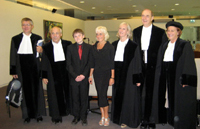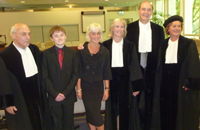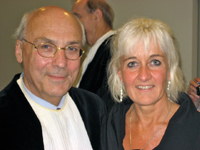Aileen Tierney
DISSERTATION TITLE:
Dialogue: A Connection of Roots and Branches
Project Focus:
The objective of this project was to involve stakeholders in dialogical forums, with a view to considering labeling discourses and the construct dis-abilty.
Dialogical Forums:
The use of dialogical forums refers to large-scale facilitated conversations amongst stakeholders, who have an interest in the question(s) under consideration.
Stakeholders refers to all those with a particular interest in the area, which may include the general public, educators, parents, learners, special needs coordinators, multi- disciplinary professionals, employers, health services, dis-ability organizations, voluntary organizations and people who live with dis-ability labels.
Dis-ability:
The word dis-ability is hyphenated throughout to deconstruct and provide challenge to the application of static constructs of dis-ability and to examine/highlight, the simultaneous multiple occupancy of other positions. It is also used in this way to highlight the disabling nature of labels, and places a focus on the dichotomies of ability and dis-ability. This project initially sought to consider how cross sectional dialogue(s) amongst stakeholders, in the dis-ability sector, have the potential to create enriched reflections.
These reflections can contribute to, and help facilitate a more inclusive approach to the planning of new services and the review of the provision of existing services.
The enquiry was compiled using a combination of literature reviews, and documentation and a presentation of and response to transcripts of participative dialogue(s) amongst a cross section of stakeholders from health, education, Voluntary organizations and service users in the specific area of learning dis-ability.
The term specific learning dis-abilty is generally seen to encompass the diagnostic categorise of Dyslexia, Dyspraxia, ADHD and Aspergers syndrome.
The enquiry argues for the capacity and potential of stakeholder dialogue(s) to make a significant contribution to service developments, and for the conversations to be both generative and transformative. It is hoped that this enquiry will add to the growing development of emancipatory and inclusive methodologies for planning and reviewing service delivery in the disability sector.
A Responsive Dialogical Approach: The approach taken in this enquiry is a responsive one to both the emerging enquiry and the emerging social products (data). It is an approach, which also highlights and pays attention to my own journey and shifting positions in and through the narration of the enquiry story. This ‘responsive dialogical approach’ is reflected in the narration of the meandering path of the enquiry, the review of the project dialogues and in the descriptions of the ‘in -the moment nature’ of the enquiry itself. I use the term responsive dialogical approach to describe an ‘in -the moment response” as opposed to a pre-planned approach or a retrospective analysis. The approach is dialogical, in the sense that it engages in a response to and with what is emerging. In considering this type of approach. I was also very influenced by TS. Eliot’s ideas (1944 p.3) in relation to time.
“Time present and time past are both perhaps present in time future and time future contained in time past “ and therefore responding in the moment as if all is present to us. Eliot (1944) also speaks to multiple discourses ‘what might have been is an abstraction remaining a perpetual possibility’. It was this idea of holding open space for all possibilities as opposed to closing down possibilities in abstraction or reductive forms of analysis, that suggested a responsive dialogical approach as being the best fit for this particular enquiry. A dialogical responsive approach was more coherent, particularly given the more fluid nature of constructing and deconstructing labeling discourses, with which this enquiry is engaged.
Systemic ideas also influenced this enquiry, particularly the ideas in relation to mutual influence. Systemic practitioners and writers consider the systems in which people reside (Dallos and Draper 2000).
A Systems theory view sees the person as embedded in a social and emotional world, which s/he is constantly being influenced by, and is constantly influencing. This approach takes account of the multi-layered complexity of the many systems in which we live. In this enquiry by taking a responsive dialogical approach was coherent with attending to these ideas of mutual influence and as a consequence the constant constructing and deconstructing which takes place in the space between people. As a metaphorical analogy, the approach taken in this enquiry was more closely aligned to Indra’s net than to Ockham’s razor.
The former is a web like net in which jewels are spread across it and are infinite in number. If one jewel is selected and examined, its polished surface reflects all the other jewels. Each jewel is reflects all of the others and so in this way the process of reflection is infinite. While it is not possible in this enquiry, which is finite, to hold all the reflections of reflections infinitely, a responsive dialogical approach in my view holds open more possibilities.
Occam’s razor on the other hand, more closely reflects an analytical approach to data analysis based on categorization and abstraction.
Occam’s Razor is attributed to a 14th century theologian William of Ockham who wrote “entities must not be multiplied beyond necessity” This is also phrased as pluralitas non est ponenda sine necessitate, “plurality should not be posited without necessity”. In this enquiry, by being responsive, I am attempting to encourage the ‘multiplication of entities’ and support the expression of pluralistic views of the meaning of dis-abilty.
The style of writing utilized in this enquiry is conversational, in keeping with the dialogical nature of the project. A responsive dialogical approach is utilized, in particular, as one way of being coherent with the project dialogue itself, whilst simultaneously keeping faith with the principles of collaborative dialogue throughout the whole enquiry. The views of those involved in this project both in relation to dis-ability labels and in relation to the dialogical process in which they had participated, are re=presented and responded to. I use the word represented hyphenated here, to highlight the fact that I am not purporting to represent the perspectives of the participants but that instead I am presenting them again with a response as author/narrator as opposed to an ‘interpretation’ as researcher.
Some of the other significant features of this enquiry are the accounts of ‘sideways glimpses’ glimpsed observations of self in the process of the enquiry, together with an account of the ways in which I have both influenced and been influenced by this enquiry process and the attention to fluidity and movement as responses both throughout the enquiry and in the deconstruction of dis-ability as a static construct. These glimpses of self, in many ways, form part of the myriad of reflections on reflections, in the process of engaging in a responsive approach to the research enquiry.



